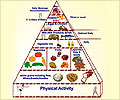A major study has confirmed that residents in the European Union's wealthier nations live in good health up to 14 years longer than their more recent EU neighbours to the east.
Residents in the European Union's wealthier nations live in good health up to 14 years longer than their more recent EU neighbours to the east, according to a major study published Monday.
European nations averaging the fewest "healthy life years" -- time lived without disability or limitations on activity after the age of 50 -- face serious challenges in containing health care costs, the study concluded.They will also be hard put to achieve EU targets of raising the employment rate among 55 to 64 year olds to 50 percent by 2010, the researchers found.
Life expectancy in Europe has been steadily climbing, and reached an average of 78.6 years for men who were 50 in 2005, and 83.5 years for women.
The gap between nations with the shortest and longest average lifespan was 9.1 years for men (71.3 in Lativa compared to 80.4 in Italy), and a narrower 6.1 years for women (79.3 in Latvia and 85.4 in France).
What has remained unclear, however, was how many of these added years were spent in good -- and potentially productive -- health.
Sifting though national and European statistics, a team of researchers led by Carol Jagger at the University of Leicester in Britain found huge gaps across the continent.
Advertisement
The highest average age is 73.6 in Denmark, and the lowest 59.0 in Estonia.
Advertisement
"Generally, citizens of the established European community" -- the so-called EU-15 nations -- "have both longer and healthier lives than do most of those of the ten new EU countries," the researchers conclude.
The study found that productive health among seniors was directly linked to the wealth of the nation and the percentage of its gross domestic product spent on elderly care.
It also showed that a bit of preventive medicine in less-wealthy countries goes a long way: "A one percent increase in spending on elderly care would result in a one-year increase in healthy life years (HLY) at 50 in the EU 15, compared to a 13-year increase in the ten newly joined EU countries," the report said.
In a comment, also published in The Lancet, Errol Crook and Terry Hundley of the University of South Alabama point out that "the major reason for the gaps in health outcomes are disparities in treatable chronic diseases."
The findings also cast a shadow over the EU's target of reaching a 50 percent employment rate by 2010 for workers 55-64 years of age.
The health problems of 50- and 60-year-old men and women in most of the newer EU nations "suggest that this target will not be achieved in some countries unless substantial health improvements are made," it said.
The average across the 25 EU countries in 2005 was 67.3 years free of activity limitations for men, and 68.1 years for women.
For both women and men, Britain, France and Greece are above the EU average, while Germany, Finland, Portugal and the Czech Republic are all below.
The study drew from 2005 statistics, and thus did not cover the two newest members of the European Union -- Bulgaria and Romania -- which entered the Union in 2007.
Source-AFP
SPH










